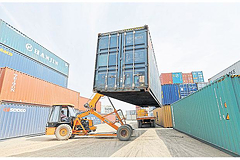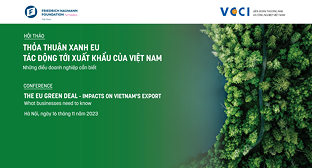TPP-11 still a better deal than RCEP, says ex-WTO chief
08/01/2018 12:00

The Trans-Pacific Partnership agreement (TPP) may have suffered a setback after the US backed out last year, but the remaining 11 member countries would still benefit by forging ahead with the deal, says Pascal Lamy, former director-general of the World Trade Organisation (WTO).
“The TPP-11 is still more integrative in the medium- to long-term than the Regional Comprehensive Economic Partnership (RCEP) and even the WTO,” he said in an exclusive interview with The Edge Financial Daily.
The agreement, which could retain most of its elements without the intellectual property chapter, had surprisingly been pushed forward strongly by Japan, countering the narrative that the TPP is dead without the US.
Lamy explained that the agreement had been a “zombie” even before US president Donald Trump pulled out early last year. This is because the agreement — which now involves Japan, New Zealand, Australia, Canada, Mexico, Peru, Chile, Venezuela, Malaysia, Vietnam, and Brunei — had not been passed by the Senate under the Obama administration.
On the other hand, the RCEP — which is an initiative involving all 10 Asean countries, China, India, Japan, New Zealand, Australia and South Korea — offers shallower measures of trade liberalisation than the TPP.
“The RCEP is mostly about goods and due to the diversity of the countries involved, the least common denominator cannot be very ambitious,” Lamy said.
Speaking after a seminar on global trade in an age of rising protectionism organised by the Institute of Democracy and Economic Affairs (Ideas), he noted that while the threat of US protectionism still appears to be “more bark than bite”, there are alarm bells to look out for.
On top of anti-dumping measures and “rocking the boat” against the WTO’s dispute settlement mechanism, some elements in the House (US) version of the US tax reform bill appeared to discriminate against open trade, Lamy said.
“The jury is still out on Trump’s threats against China, but just because it [sounds like] nonsense doesn’t mean he won’t consider it,” he said.
Despite China’s rise as a global economic powerhouse, Lamy maintains the Asian giant is not as open to trade as it claims to be.
“There has been little progress in trade liberalisation even after China became a member of the WTO,” he said, adding that if the country was serious about driving growth in domestic consumption, it would liberalise its services sector.
Lamy also noted that China’s model of development appears to be put “on sale” by its leaders, who are actively touting their national policies which include some level of authoritarianism. This is not a new practice among Asian leaders who have seen strong economic growth in their nations in the past, he said, citing former Malaysian prime minister Tun Dr Mahathir Mohamed and Indonesia’s ex-president Suharto as examples.
But while countries such as Thailand, Vietnam and Laos seem to share similarities with China’s development model, countries like Malaysia and Indonesia are nearer to having Western democratic systems in place, Lamy highlighted.
That being said, there is still a lot to be done to improve democratic processes in Malaysia, he noted, as he recommended a two-pronged approach that involves growing the middle class and improving good governance, legislation, and whistleblower protection.
“Growing the part of your population that pays taxes is the best way to fight corruption,” he told reporters last Thursday, adding that there is a direct correlation between economic growth and lower graft.
While Malaysia remains on track to achieve high-income nation status by 2020 as it has stuck to a clear strategy and has a good trade balance “for the moment”, Lamy stressed the importance of redirecting resources towards improving education and human empowerment.
On the subject of lowering income inequality, Lamy opined that although inequality typically rises in tandem with economic growth, there is a need to “grow the cake so everyone can enjoy more of it.”
As a country, such as Malaysia, continues to focus on becoming a high-income nation, tough decisions that are “painful for some” would have to be made, he noted.
Nevertheless, redistributive policies and addressing initial inequalities such as those among children can also be introduced to level the playing field, he said.
Interestingly, Lamy attributes the rise in protectionism in the developed world to a failure to distribute the benefits of trade equally.
“Social systems have failed to cope with these changes, either because globalisation has been too rapid for welfare systems to keep up with, or because these welfare systems have been shrunk in favour of other objectives such as financial deleveraging,” he added.
Lamy was in Malaysia to promote France’s bid to host the 2025 World Expo, which is centres around the “hopes and fears” of millennials, and themed “Sharing our knowledge, caring for our planet”.
The last time France held the Expo was in 1889, it unveiled the Eiffel Tower.
This time around, there are talks to develop an “Eiffel Tower of the 21st century”, a structure that will be driven by data, research, and technology, according to Lamy.
Source: The Edge Markets
Các tin khác
- More efforts needed to maintain export growth to China: Insiders (24/04/2024)
- Shadow trade minister calls for greater focus on removal of Chinese trade barriers (24/04/2024)
- New U.S. Solar Panel Tariff Intensifies Sino-American Green Tech War (24/04/2024)
- It is expected that there are higher orders and revenue in the second quarter from European businesses (24/04/2024)
- U.S. Ceramic Manufacturers Seeking Tariffs Against Indian Import (24/04/2024)
 Home
Home
 About Us
About Us




















